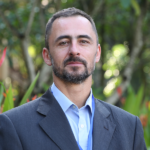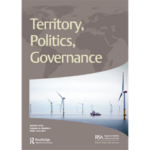2024 RSA Winter Conference Plenary Sessions and Speakers
For all information on the Plenary Sessions and Speakers for the RSA 2024 Winter Conference, please see below. To return to the main conference website click here.
Thursday 7th November 2024, 09.15 – 10.30 GMT
Opening Plenary – The Future of the RSA
As the Regional Studies Association (RSA) approaches its 60th anniversary year, this is a pivotal time in the development of the Association. We have a new Chief Executive (the first in a generation), a new President and will soon be appointing a new Chair. This is therefore an opportune moment to consider the future direction of the RSA.
In a break with tradition, this year’s opening plenary invites a discussion on emerging ideas for a new RSA strategic plan. The process of formulating such a plan invites us all to revisit and re-articulate what regional studies and the RSA stand for today; to articulate what we want to achieve in the years ahead; and to build consensus on our priorities for action. Once completed, the aim of the strategic plan will be to enable the RSA to thrive in the world in which it will be operating from 2025-30 and to support all who engage with the Association.
This session on ‘the future of the RSA’ provides an opportunity for RSA leaders to share emerging ideas. Equally importantly, the session will invite all audience members to share their views on the challenges, opportunities and priorities that lie ahead for regional studies and the RSA.

Heike Mayer is professor of economic geography at the University of Bern in Switzerland. Her research is in local and regional economic development with a focus on dynamics of innovation and entrepreneurship, place making and sustainability. Heike started her academic career in the United States, where she completed a Ph.D. in Urban Studies (Portland State University) and held a tenured professorship at Virginia Tech University. She is author of the book Entrepreneurship and Innovation in Second Tier Regions (Edward Elgar, Cheltenham), co-author of Small Town Sustainability (Birkhäuser Press, Basel), and co-author of The Political Economy of Capital Cities (Routledge, London).

Alan is the Chief Executive of the Regional Studies Association and General Manager of the RSA Europe foundation. He joined both organisations in February 2024, arriving with extensive experience of organisational and professional leadership. Alan’s background is as a geographer and geography educator. He led the Geographical Association (GA) for over 11 years and played an active role in national and international education policy for over 20 years, exerting a considerable influence on the curriculum and professional practice we see in geography education today. Alan’s key responsibilities include strategic and organisational leadership, securing the sustainable development of both the RSA and the RSA Europe foundation and acting as the principal ambassador for each organisation.

Sarah Ayres is the Professor of Public Policy and Governance at the University of Bristol, UK. Her central research interest is the governance of place, space and territory. This core provides the basis for two main strands of work. First, her research is concerned with devolution and decentralisation in both a UK and an international context, with a particular emphasis on analysing inter-governmental relations between central government and local actors. Second, it has explored the role of partnership working and network management in the governance of territory. Sarah is a political scientist with expertise in public administration and theories of policy making. Her research is concerned with territorial and collaborative governance – how actors from state, market and civil society coalesce and work with one another in specific localities. Details on research projects, publications and professional roles can be found at https://www.bristol.ac.uk/sps/people/sarah-a-ayres/overview.html
Thursday 7th November 2024, 16.15 – 17.15 GMT
Plenary 2 – Pedagogies of Regional and Urban Studies
More information to follow soon

Daniel Whittall is Research Engagement Lead for the Geographical Association, as well as a teacher of Geography at a 6th Form College in West Yorkshire. He has a PhD in Geography, and his recent research interests and publications have focused on pedagogy, curriculum and knowledge-making in the context of school geography education.

Kerstin J. Schaefer is an assistant professor in Economic Geography at Utrecht University (UU) and a research project leader at the Institute of Economic and Cultural Geography at Leibniz University Hanover (LUH). Her active engagement in the Economic Geography scholar community includes serving as RSA Early Career representative and supporting the Young Economic Geographers Network (YEGN).
She is working on topics related to innovation, standardization and new mobility technologies. Her research has been spanning boundaries between Economic Geography and International Business Studies as well as Transport Studies. During her PhD, she analyzed the role of experienced inventors at offshore labs for building innovation capability in latecomer firms. Her findings emphasize the importance of participation in global industry standards for emerging region firms’ competitiveness. This motivated her to further investigate the participation of emerging region firms, in particular from China, in the standardization of new technologies created to enable automated driving. She is further interested in the future of mobility and transport, and the social implications of new technologies in this sector. In her research on the digitalization of mobility access via apps, she investigates the risk of transport related social exclusion by the increasing digitalisation of access to public transport.

Michiel van Meeteren’s main research interest is studying the past, present, and future of geographic thought and curricula. Geography is an interdisciplinary discipline bridging the social sciences, the natural sciences and the humanities by drawing focus on interactions of phenomena in space.
However, this role requires of geography to continually reinvent itself, by forging new collaborations, translating between disciplines and absorbing new knowledge. In order to do so effectively, he helps build overview of geography’s past trajectories, Moreover, bridging disciplinary languages requires proficiency in translating and combining widely diverging epistemologies. Unifying diverse perspectives in the geographical perspective is another key goal of his research. Lastly, geography has much to offer to understand today’s and tomorrow’s problems. Climate change, technological development, inequality, urbanization, population movement, and economic crises are all profoundly geographical and hinge on human-environment relationships. However, in order for geography its contribution, it needs itself to overcome historically grown internal boundaries, not in the last place between human and physical geography.

Dr Stefania Fiorentino’s research focuses on the intersection of urban planning and local economic development to identify more inclusive and innovative regeneration strategies. Stefania’s research is highly impact-driven and directly engages with policymakers.
She looks at urban and regional transformations and the way economic shifts produce changes in the demand, supply, and experience of spaces; recent research projects include work on the business and governance of densification strategies, the evolution of working spaces, industrial clusters and the geography of innovation, the regeneration of coastal towns and planning for regional inequalities.
Stefania is also a fellow of Downing College (Cambridge), and an honorary lecturer at the Bartlett School of Planning, University College London (UCL).
Before coming to Cambridge in 2020, she extensively lectured and led research on different topics cutting across the fields of urban planning, economic geography, and urban regeneration between the Bartlett (UCL) and London South Bank University (LSBU). She holds a PhD in Planning Studies from the Bartlett School of Planning (UCL).
Her work has been published in several leading international journals and media outlets. She serves on several editorial boards, including the Cambridge Journal of Regions Economy and Society, and the Journal of Property Investment and Finance. She is an active member of several learned societies and she currently sits on the board of the Regional Studies Association (RSA) and regularly acts as a blind reviewer for international academic journals and grant funders.
Given the international and comparative nature of her research, she is regularly invited to deliver guest lectures, keynotes, and research visits (e.g., University of Toronto, Politecnico di Milano, Chinese University of Hong Kong, etc.).
Before becoming an academic, Dr Stefania Fiorentino trained as a chartered engineer and she has worked in international consultancies across Italy, France and the UK with leading expertise in the fields of real estate, urban planning and economic development. As an academic she keeps contributing to consultancy, thought leadership, and influencing policy-making, acting as an external expert for bodies like the EU Commission or the House of Lords.
Friday 8th November, 11.30-12.30 GMT
Plenary 3 – TPG Lecture
The Region Strikes Back? The Spatial Politics of Backlash Against Sustainable Urbanism

There appears to be a growing political and populist backlash against climate-related policies across Europe and North America. In this talk I argue that this can be read as a regional backlash against the urban sustainability agenda. This agenda has become hegemonic in both policy and academic circles, with emphasis on liveability, walkability, public transport, and green spaces. Arguably, this agenda has been overly focused on resolving climate and energy challenges in urban cores, overlooking regional implications. While many cities have been quite successful in mitigating climate change and environmental problems, this urban-centric focus has arguably had a number of political-economic effects negatively affecting the peri-urban region. Road tolls, infrastructure investments and parking restrictions in cities are seen to affect peri-urban residents disproportionally. And this is exacerbated by a perceived cultural ‘war’ against private cars. My own home region of Bergen and other European cases will be used to illustrate these dynamics.
Right-wing populist tendencies have multiple and complicated root causes. Yet, in closing, I want to reflect on the role that the urban sustainability agenda, which our academic community has been part of advancing, may have played in increasing urban-regional polarisation and populist backlash. How can we rethink urban-regional sustainability transitions in less polarising ways?

Håvard Haarstad is professor of human geography, and director for the Centre for Climate and Energy Transformation (CET) at the University of Bergen. His main research focus is social change towards sustainability, particularly in relation to climate. He is interested in how we can transform cities and urban life – materially, socially and culturally – in order to meet the climate and sustainability challenges that face us.

Vanesa Castán Broto is a Professor of Climate Urbanism at the Urban Institute at the University of Sheffield. She leads a research group on Climate Urbanism. Her project Low Carbon Action in Ordinary Cities (2019-2024) explores new urban innovation trends for climate change, funded by the European Research Council. Her project Community Energy and Sustainable Transitions in East Africa, CESET (2020- 2023) explores the potential for off-grid energy access, funded by the UK Global Challenges Research Fund. Vanesa has recently published two books: Urban Energy Landscapes (2019, Cambridge University Press) and Urban Sustainability and Justice (2019, ZED Books, with Linda Westman). Her new co-edited collection on Climate Urbanism is forthcoming (2021, Palgrave, with Enora Robin and Aidan While).

Zack Tayor is Associate Professor of Political Science at the University of Western Ontario, Canada. Specializing in comparative urban political economy, the multi-level governance of cities, and political geography, his work lies at the intersection of political science, urban geography, planning studies, and urban sociology. He is a fellow at the Institute on Municipal and Governance at the University of Toronto’s School of Cities, a non-practicing registered professional planner, and founding director of the University of Western Ontario’s Centre for Urban Policy and Local Governance. He is Editor-in Chief of the RSA Journal Territory, Politics, Governance. His work has been published in Regional Studies, Urban Affairs Review, Comparative Political Studies, Journal of Ethnic and Migration Studies, Local Government Studies, Planning Theory, Town Planning Review, Journal of Urban Affairs, Canadian Journal of Political Science, and the International Journal of Politics, Culture, and Society. His book Shaping the Metropolis: Institutions and Urbanization in the United States and Canada was published by McGill-Queen’s University Press in 2019.